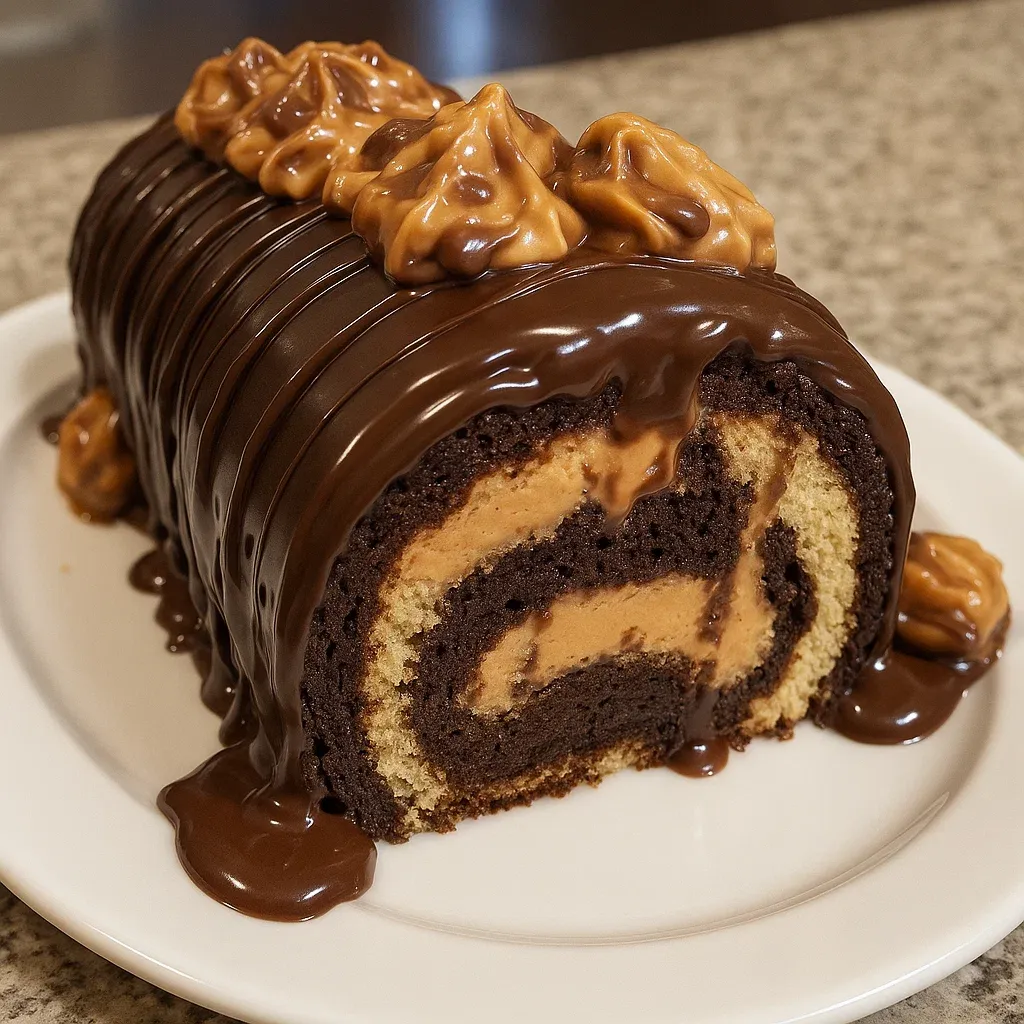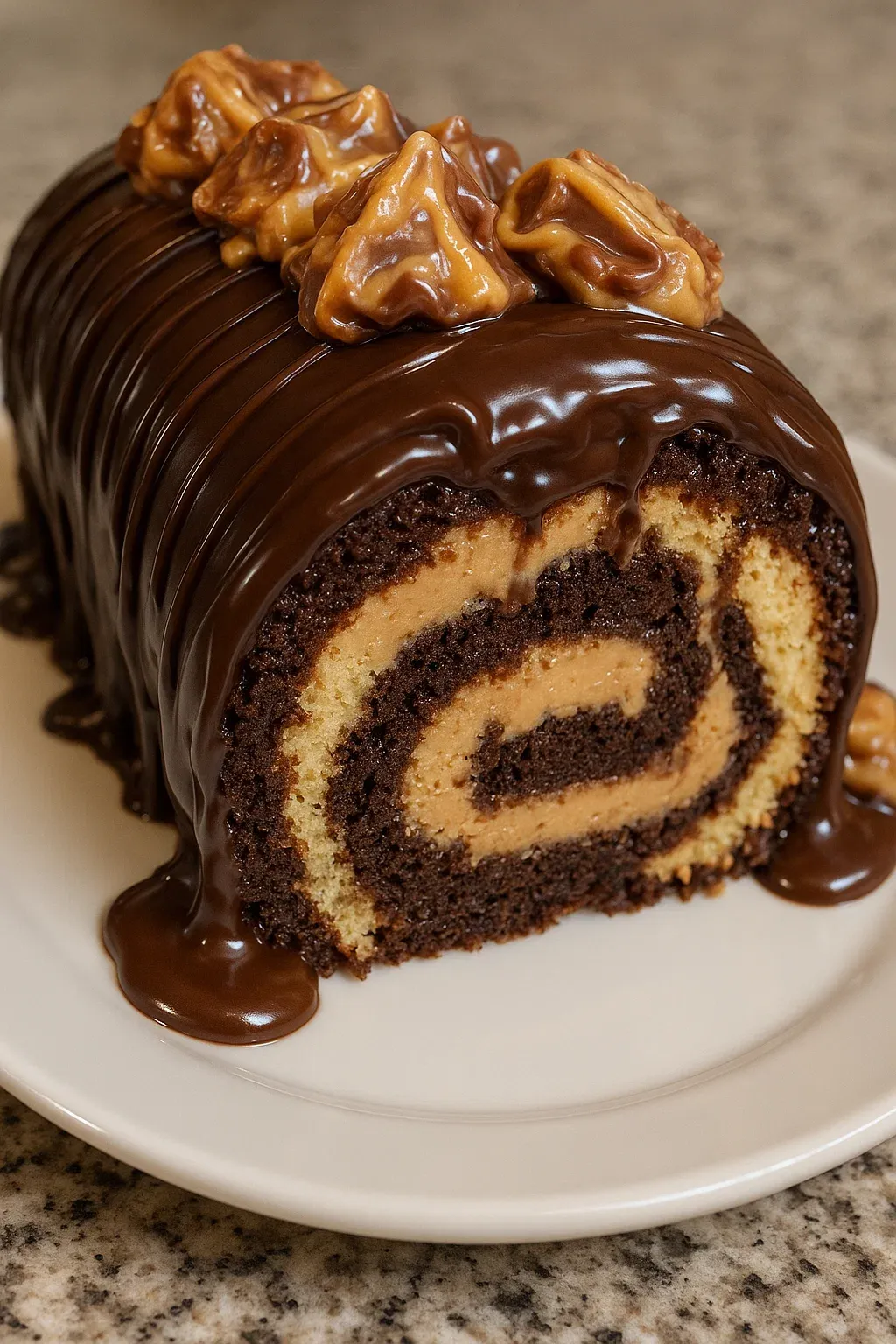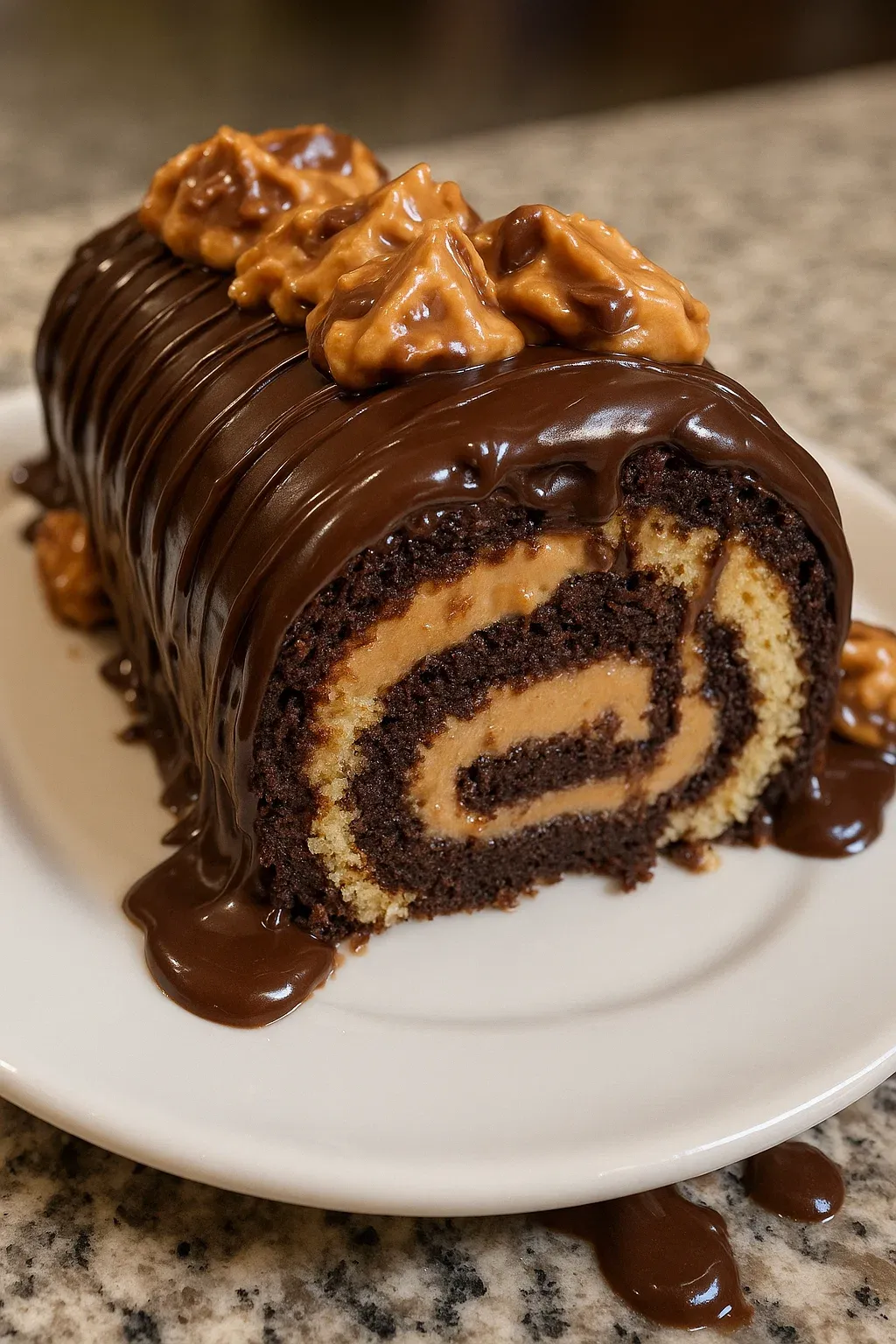 Pin it
Pin it
This decadent Peanut Butter Cup Chocolate Roll Cake combines two beloved flavors—rich chocolate and creamy peanut butter—into an impressive dessert that looks complicated but is surprisingly achievable. The light chocolate sponge cake wraps around a luscious peanut butter cream filling studded with mini peanut butter cup pieces for an unforgettable treat.
I first made this cake for my nephew's birthday party when I needed something special but was short on time. The look on everyone's faces when I sliced into it made all the effort worthwhile, and now it's requested at virtually every family gathering.
Ingredients
- Large eggs: Four eggs provide structure and lift to create that perfect spongey texture essential for rolling without cracks
- All purpose flour: Creates the foundation for our cake while keeping it light enough to roll
- Unsweetened cocoa powder: Delivers rich chocolate flavor without making the cake too sweet
- Baking powder: A small amount ensures the cake rises just enough without becoming too fluffy to roll
- Salt: Enhances all the flavors and balances sweetness
- Granulated sugar: Sweetens the cake batter and helps create volume when beaten with eggs
- Powdered sugar: Used for both dusting the towel and sweetening the filling without graininess
- Smooth peanut butter: Choose a commercial brand like Jif or Skippy for the most reliable texture in the filling
- Heavy cream: Whips into a light base for our filling making it spreadable and decadent
- Mini peanut butter cups: Adds texture and concentrated bursts of peanut butter chocolate flavor
Step-by-Step Instructions
- Prepare the oven and pan:
- Begin by preheating your oven to 350°F and lining your baking sheet with parchment paper ensuring it covers the sides for easy removal later. A light coating of cooking spray under the parchment helps it stay in place.
- Create the egg base:
- Beat the eggs and granulated sugar for a full 5 minutes until the mixture has tripled in volume and become pale yellow. This extended beating creates the air bubbles that replace traditional leavening agents making the cake light enough to roll.
- Incorporate dry ingredients:
- Sift the flour cocoa powder baking powder and salt together to remove any lumps before gently folding them into the egg mixture. Use a rubber spatula and perform a figure eight motion cutting through the middle to preserve the air you worked so hard to create.
- Bake the sponge:
- Spread the batter evenly using an offset spatula to reach the corners. Tap the pan gently to release large air bubbles. The cake bakes quickly so start checking at 10 minutes a properly baked cake should spring back when touched in the center.
- Prepare for rolling:
- While the cake bakes lay out a clean kitchen towel and dust it generously with powdered sugar. This prevents sticking when you roll the hot cake. Work quickly when the cake comes out inverting it immediately onto the towel before it has a chance to cool and become less flexible.
- Make the filling:
- Whip the heavy cream to soft peaks before gently folding in the powdered sugar and peanut butter. The filling should be thick enough to hold its shape but still spreadable. If too thick add a tablespoon of heavy cream if too loose refrigerate briefly.
- Assemble the cake:
- Once cooled unroll the cake gently spread the filling leaving a half inch border and sprinkle chopped peanut butter cups evenly across the surface. Roll it back up using the towel to guide but not include it this time helping you achieve a tight spiral without applying too much pressure.
 Pin it
Pin it
This cake reminds me of the chocolate peanut butter ice cream my grandmother would serve on summer evenings. The combination is timeless and I find myself returning to it whenever I need a foolproof crowd pleaser. The mini peanut butter cups add that perfect bit of textural contrast that makes everyone smile with recognition at the first bite.
Preventing Cake Cracks
The most common issue with roll cakes is cracking, but several techniques help prevent this. First, never overbake the cake—even one minute too long can make it too dry to roll. Second, rolling the cake while warm trains it into shape. Finally, let the cake cool completely before unrolling to add filling; rushing this step often leads to tears in the cake. If small cracks do appear, don't worry—the filling and powdered sugar topping will hide minor imperfections.
Make Ahead Options
This roll cake actually improves with a little time in the refrigerator, making it perfect for entertaining. You can prepare it completely up to two days ahead and keep it wrapped in the refrigerator. For longer storage, the unfilled cake can be frozen for up to a month—just wrap it tightly in plastic wrap and then foil while still in its rolled shape with the towel. Thaw overnight in the refrigerator before unrolling to fill.
Serving Suggestions
While this cake is stunning on its own, you can elevate it further with accompaniments. A drizzle of warm chocolate ganache over the top creates a beautiful presentation, or serve slices with a scoop of vanilla ice cream for a delightful temperature contrast. For a special occasion, present the cake on a rectangular platter dusted with cocoa powder and surrounded by additional chopped peanut butter cups and fresh berries.
 Pin it
Pin it
Frequently Asked Questions
- → Can I use natural peanut butter for the filling?
Yes, natural peanut butter can be used, but ensure it is well-mixed to avoid the filling becoming too oily or runny.
- → How do I prevent the cake from cracking when rolling?
Rolling the cake while it is still warm in a powdered sugar-dusted towel helps set the shape and prevent cracking.
- → Can I make this cake ahead of time?
Absolutely! Prepare the cake a day in advance, store it in the fridge, and dust it with powdered sugar just before serving.
- → What can I use instead of mini peanut butter cups?
Chopped peanuts, chocolate chips, or caramel bits make great alternatives to mini peanut butter cups.
- → Can I freeze this cake?
Yes, wrap it tightly in plastic wrap and freeze for up to one month. Thaw in the fridge overnight before serving.
- → How can I make this cake gluten-free?
Substitute all-purpose flour with a gluten-free flour blend designed for baking to ensure light and fluffy results.
